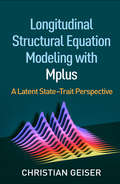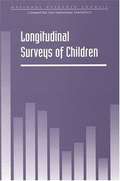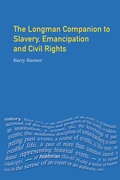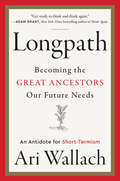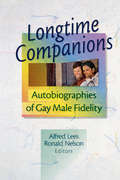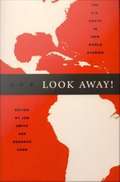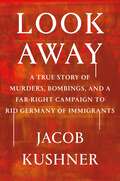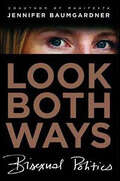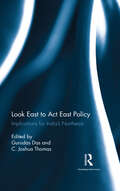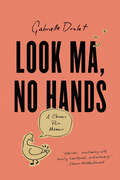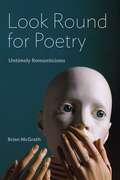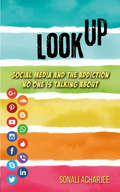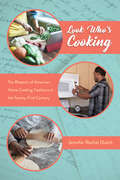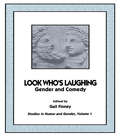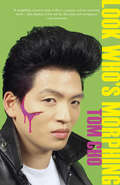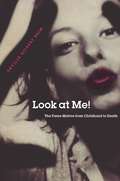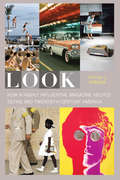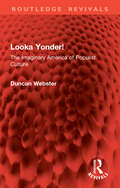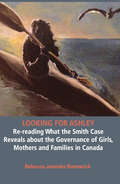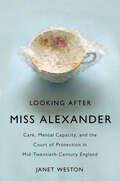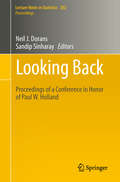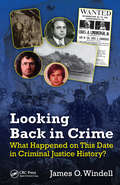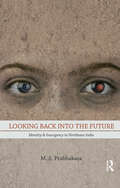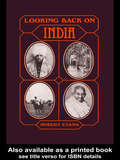- Table View
- List View
Longitudinal Structural Equation Modeling with Mplus: A Latent State-Trait Perspective (Methodology in the Social Sciences)
by Christian GeiserAn in-depth guide to executing longitudinal confirmatory factor analysis (CFA) and structural equation modeling (SEM) in Mplus, this book uses latent state–trait (LST) theory as a unifying conceptual framework, including the relevant coefficients of consistency, occasion specificity, and reliability. Following a standard format, chapters review the theoretical underpinnings, strengths, and limitations of the various models; present data examples; and demonstrate each model's application and interpretation in Mplus, with numerous screen shots and output excerpts. Coverage encompasses both traditional models (autoregressive, change score, and growth curve models) and LST models for analyzing single- and multiple-indicator data. The book discusses measurement equivalence testing, intensive longitudinal data modeling, and missing data handling, and provides strategies for model selection and reporting of results. User-friendly features include special-topic boxes, chapter summaries, and suggestions for further reading. The companion website features data sets, annotated syntax files, and output for all of the examples.
Longitudinal Surveys of Children
by Committee on National StatisticsThe Committee and the Board on Children, Youth, and Families convened in September a workshop to discuss ways to foster greater collaboration and sharing of information among principal investigators of several longitudinal surveys of children. Among many topics discussed were issues of coverage and balance of content, sampling design and weighting, measurement and analysis, field operations, legitimation and retention of cases, data disclosure and dissemination, and resources available for longitudinal studies. The workshop was sponsored by the National Institute on Justice.
Longman Companion to Slavery, Emancipation and Civil Rights
by Harry HarmerThis Companion provides the essential background to the defining fate of the African diaspora in the Americas and the Caribbean from the 15th to the 20th centuries. Central to the book are detailed chronologies on the development and decline of the slave trade, slavery in colonial North and South America, the Caribbean and the United States, movements for emancipation, and the progress of black civil rights. Separate sections look at the long-running resistance against slavery and the black civil rights movements in the Americas and the Caribbean, with a comparative chronology of apartheid in South Africa. Supported by biographies of over 100 key individuals and a full glossary providing definitions of crucial terms, expressions, ideas and events, this is required reading for anyone interested in the historical experience of slavery.
Longpath: Becoming the Great Ancestors Our Future Needs – An Antidote for Short-Termism
by Ari Wallach"An antidote to nearsightedness. Ari Wallach won’t just leave you planning months or years ahead—he challenges you to look generations ahead. Get ready to think and think again." — Adam Grant, #1 New York Times bestselling author of Think Again and host of the TED podcast WorkLifeA paradigm-shifting manifesto for transforming our thinking from reactionary short-termism to the long-term, widening our scope beyond today, tomorrow, and to even five hundred years from now to reclaim meaning in our lives.Many of the problems we face today, from climate change to work anxiety, are the result of short-term thinking. We are constantly bombarded by notifications and “Breaking News” that are overwhelming our central nervous systems, forcing us to react in the moment and ultimately disconnecting us from what truly matters. But there is a solution.Futurist Ari Wallach offers a radical new way forward called “longpath,” a mantra and mindset to help us focus on the long view. Drawing on history, theology, neuroscience, evolutionary psychology, and social technologies, Longpath teaches readers to strengthen their ability to look ahead, relieve reactions to stressful events, increase capacity for cooperation, and even boost creativity. Wallach challenges readers to ask themselves, “to what end?”—what is my ultimate goal and how does my choice align with my values? And even more provocatively, Wallach challenges readers to ask “to what end?” for civilization at large.Whether it’s work, marriage, parenting, or simply trying to be a good human on the planet, framing decisions from a much larger scale creates a more fulfilling and sustainable life now and for future generations.
Longtime Companions: Autobiographies of Gay Male Fidelity
by Alfred Lees Ronald NelsonLongtime Companions: Autobiographies of Gay Male Fidelity provides a sophisticated alternative to “anything goes” gay literature. Challenging the stereotype that gay men are incapable of lasting and successful relationships, 15 long-term gay couples share slices of their own lives to give you insight into their present relationships, while some discuss life after their mates have passed on. You will find that their stories offer an inspirational and richly fulfilling alternative to an empty life of promiscuity that lacks true love.Through a treasury of autobiographical essays, Longtime Companions documents how committed gay male unions can be as enduring, nurturing, and diverse as heterosexual marriages and proves that loving commitments and life-sharing are not exclusive to heterosexual unions. A celebration of gay diversity, this book offers you insights from contributors of different ages, professions, geographic locations, and attitudes. You will learn the intimate details of the couples’lives, including: how they met their partners how soon they committed to each other how long the couples have been together--from 14 years to over 50 years their keys to leading successful, happy lives the ways in which their relationships fulfill their personal needs and contribute to community lifeYou will come to realize the true strength of these men’s relationships as you share in their struggles within a society that offers them little recognition or support for their successful relationships. Co-editor Alfred Lees explains in the introduction to Longtime Companions, “We’ve all worked diligently to make our partnerships sound, nurturing, and enduring. We’ve done this without any social motivation, largely without role models, in the face of ‘official’disapproval or contempt. We’ve told our stories here to refute--by the simple facts of our experience--the grotesque misrepresentation of gays as being incapable of stable, committed relationships.” Will add more. . . Through a treasury of autobiographical essays, Longtime Companions documents how committed gay-male unions can be as enduring, nurturing, and diverse as heterosexual marriages and proves that loving commitment and life-sharing are not exclusive to heterosexual unions. A celebration of gay diversity, contributors vary in age, profession, geographic location, and attitudes. You will learn the intimate details of the couples’lives, including: how they met their partners how soon they committed to each other how they managed to collaborate on successful, fulfilling lives how some have maintained their commitment as part of an open relationshipYou will come to realize the true strength of these men’s relationships as you share in their struggles within a society that offers them little recognition or support for their successful relationships. Co-Author Alfred Lees explains in the Introduction to Longtime Companions, “We’ve all worked diligently to make our partnerships sound, nurturing, and enduring. We&’ve done this without any social innovation, largely without role models, in the face of ‘official” disapproval or contempt. We’ve told our stories here to refute--by the simple facts of our experience--the grotesque misrepresentation of gays as being incapable of stable, committed relationships.”
Look Away!: The U. S. South in New World Studies
by Jon Smith Deborah CohnLook Away! considers the U. S. South in relation to Latin America and the Caribbean. Given that some of the major characteristics that mark the South as exceptional within the United States--including the legacies of a plantation economy and slave trade--are common to most of the Americas, Look Away! points to postcolonial studies as perhaps the best perspective from which to comprehend the U. S. South. At the same time it shows how, as part of the United States, the South--both center and margin, victor and defeated, and empire and colony--complicates ideas of the postcolonial. The twenty-two essays in this comparative, interdisciplinary collection rethink southern U. S. identity, race, and the differences and commonalities between the cultural productions and imagined communities of the U. S. South and Latin America. Look Away! presents work by respected scholars in comparative literature, American studies, and Latin American studies. The contributors analyze how writers--including the Martinican Edouard Glissant, the Cuban-American Gustavo Prez Firmat, and the Trinidad-born, British V. S. Naipaul--have engaged with the southern United States. They explore William Faulkner's role in Latin American thought and consider his work in relation to that of Gabriel Garca Mrquez and Jorge Luis Borges. Many essays re-examine major topics in southern U. S. culture--such as race, slavery, slave resistance, and the legacies of the past--through the lens of postcolonial theory and postmodern geography. Others discuss the South in relation to the U. S. -Mexico border. Throughout the volume, the contributors consistently reconceptualize U. S. southern culture in a way that acknowledges its postcolonial status without diminishing its distinctiveness. Contributors. Jesse Alemn, Bob Brinkmeyer, Debra Cohen, Deborah Cohn, Michael Dash, Leigh Anne Duck, Wendy Faris, Earl Fitz, George Handley, Steve Hunsaker, Kirsten Silva Gruesz, Dane Johnson, Richard King, Jane Landers, John T. Matthews, Stephanie Merrim, Helen Oakley, Vincent Prez, John-Michael Rivera, Scott Romine, Jon Smith, Ilan Stavans, Philip Weinstein, Lois Parkinson Zamora
Look Away: A True Story of Murders, Bombings, and a Far-Right Campaign to Rid Germany of Immigrants
by Jacob KushnerA thrilling narrative investigation into the National Socialist Underground (NSU)—a German terror organization that targeted immigrants—and how a government failed to stop it. Not long after the Berlin Wall fell, three teenagers became friends in the East German town of Jena. It was a time of excitement, but also of deep uncertainty: some four million East Germans found themselves out of work. The friends began attending far-right rallies with people who called themselves National Socialists: Nazis. And, like the Hitler-led Nazis before them, they blamed minorities for their ills. From 2000 to 2011, they embarked on the most horrific string of white nationalist killings since the Holocaust. Their target: immigrants. Look Away follows Beate Zschäpe and her two accomplices—and sometimes lovers—as they became radicalized within Germany&’s far-right scene, escaped into hiding, and carried out their terrorist spree. Unable to believe that the brutal killings and bombings were being carried out by white Germans, police blamed—and sometimes framed—the immigrants instead. Readers meet Gamze Kubaşık, whose family emigrated from Turkey to seek safety, only to find themselves in the terrorists&’ sights. It also tracks Katharina König, an Antifa punk who would help expose the NSU and their accomplices to the world. A masterwork of reporting and storytelling, Look Away reveals how a group of young Germans carried out a shocking spree of white supremacist violence, and how a nation and its government ignored them until it was too late.
Look Both Ways: Bisexual Politics
by Jennifer BaumgardnerFor the acclaimed author and activist Jennifer Baumgardner, bisexuality has always been more than the "sexual non-preference of the '90s." In Look Both Ways, Baumgardner takes a close look at the growing visibility of gay and bisexual characters, performers, and issues on the national cultural stage. Despite the prevalence of bisexuality among Generation X and Y women, she finds that it continues to be marginalized by both gay and straight cultures, and dismissed either as a phase or a cop-out. With intimacy and humor, Baumgardner discusses her own experience as a bisexual, and the struggle she's undergone to reconcile the privilege she's garnered as a woman who is perceived as straight and the empowerment and satisfaction she's derived from her relationships with women.Part memoir, part pop-culture study, Look Both Ways connects the prominent dots of a bisexual community (Alix Kates Shulman, Ani DiFranco, Rebecca Walker, and, of course, Anne Heche) that Baumgardner argues have bridged feminist aims with those of the gay rights movement. Look Both Ways is a compelling and current study in bisexual lives lived secretly and openly, and an exploration of the lessons learned by writers, artists, and activists who have refused the either/or paradigm defended by both gay and straight communities.
Look East to Act East Policy: Implications for India's Northeast
by Gurudas Das C. Joshua ThomasThis volume captures the success of India’s Look East Policy (LEP) in promoting economic engagement with neighbouring countries in Asia and simultaneously its limitations in propelling growth in the bordering North Eastern Region — India’s bridge head to South East Asia. It analyses the instrumental role of LEP in bringing a tectonic shift in India’s foreign trade by redirecting the focus from the West to the East, thus leading to a fundamental change in the nature of India’s economic interdependence. Besides discussing foreign trade, it expounds as to how LEP made India play an important role in the emerging Asian security architecture and liberated Indian foreign policy from being centred on South Asia. The essays also enumerate the reasons for LEP’s failure in the North Eastern Region and chart out actionable programmes for course correction that might be factored into its latest edition — the Act East Policy. This book will interest scholars and researchers of international relations, international trade and economics, politics, and particularly those concerned with Northeast India.
Look Ma, No Hands: A Chronic Pain Memoir
by Gabrielle DroletA humorous, profound debut memoir about chronic pain, accessibility, and young adulthood, by an acclaimed essayist and cartoonist.In 2021, Gabrielle Drolet developed a condition that made her unable to use her hands. It only worsened over time, and as a writer and artist, she had to learn new ways of creating and expressing herself. The experience completely changed her life and her outlook. Look Ma, No Hands explores both the difficulty and the humour of developing chronic and life-altering pain in her twenties. Each chapter looks at a different aspect of her life touched by her disability: how she learned to write when she couldn&’t type; how she learned to manage the most mundane daily tasks. She moves cities and as her work as a writer and cartoonist builds has to navigate different byzantine health systems without the privilege or security of having a family doctor, even as she moves into her new apartment and embarks on first dates. And she does all of this with the most wonderful sense of the absurd. Look Ma, No Hands is utterly charming and shares profound reflections on life&’s curveballs, and explores how, in Drolet&’s words, &“you can live a full—even funny—life in a disabled body.&”
Look Round for Poetry: Untimely Romanticisms (Lit Z)
by Brian McGrathPoetry is dead. Poetry is all around us. Both are trite truisms that this book exploits and challenges.In his 1798 Advertisement to Lyrical Ballads, William Wordsworth anticipates that readers accustomed to the poetic norms of the day might not recognize his experiments as poems and might signal their awkward confusion upon opening the book by looking round for poetry, as if seeking it elsewhere. Look Round for Poetry transforms Wordsworth’s idiomatic expression into a methodological charge. By placing tropes and figures common to Romantic and Post-Romantic poems in conjunction with contemporary economic, technological, and political discourse, Look Round for Poetry identifies poetry’s untimely echoes in discourses not always read as poetry or not always read poetically.Once one begins looking round for poetry, McGrath insists, one might discover it in some surprising contexts. In chapters that spring from poems by Wordsworth, Lucille Clifton, John Keats, and Percy Bysshe Shelley, McGrath reads poetic examples of understatement alongside market demands for more; the downturned brow as a figure for economic catastrophe; Romantic cloud metaphors alongside the rhetoric of cloud computing; the election of the dead as a poetical, and not just a political, act; and poetic investigations into the power of prepositions as theories of political assembly.For poetry to retain a vital power, McGrath argues, we need to become ignorant of what we think we mean by it. In the process we may discover critical vocabularies that engage the complexity of social life all around us.
Look Up: Social Media and the Addiction No One Is Talking About
by Sonali AcharjeeIs a text the same as a hug? Can trolling be a full-time career? Is FOMO turning out to be a real psychological threat? Indian millennials have not only embraced the virtual space and all its extensions but are also living the fake reality. We now have the ability to reinvent ourselves online and keep our digital ego on fleek—flirting, preening, posting and filtering our way to a perfect profile. Social media has led to trading our offline family for virtual ones, relationships for app-based affairs and birthday greetings for emojis. This constant interaction with the screen is taking a massive toll on our daily lives. Young adults are risking their lives for the perfect selfie; troll wars and cyber stalkers are driving people to depression; cyber porn, for small-town religious teens, is dangerously becoming an addiction. So where do we draw the line? How much is too much? Are parental controls and restrictions effective? In this book, the author, through a series of real conversations, breaks down the digital revolution of India and seeks to understand why we’ve turned into a society of hashtags, tweets, shares and likes.
Look Who's Cooking: The Rhetoric of American Home Cooking Traditions in the Twenty-First Century (Folklore Studies in a Multicultural World Series)
by Jennifer Rachel DutchHome cooking is a multibillion-dollar industry that includes cookbooks, kitchen gadgets, high-end appliances, specialty ingredients, and more. Cooking-themed programming flourishes on television, inspiring a wide array of celebrity chef–branded goods even as self-described “foodies” seek authenticity by pickling, preserving, and canning foods in their own home kitchens. Despite this, claims that “no one has time to cook anymore” are common, lamenting the slow extinction of traditional American home cooking in the twenty-first century.In Look Who's Cooking: The Rhetoric of American Home Cooking Traditions in the Twenty-First Century, author Jennifer Rachel Dutch explores the death-of-home-cooking narrative, revealing how modern changes transformed cooking at home from an odious chore into a concept imbued with deep meanings associated with home, family, and community.Drawing on a wide array of texts—cookbooks, advertising, YouTube videos, and more—Dutch analyzes the many manifestations of traditional cooking in America today. She argues that what is missing from the discourse around home cooking is an understanding of skills and recipes as a form of folklore. Dutch’s research reveals that home cooking is a powerful vessel that Americans fill with meaning because it represents both the continuity of the past and adaptability to the present. Home cooking is about much more than what is for dinner; it’s about forging a connection to the past, displaying the self in the present, and leaving a lasting legacy for the future.
Look Who's Laugh: Gender and Comedy
by FinneyFirst Published in 1994. Routledge is an imprint of Taylor & Francis, an informa company.
Look Who's Morphing
by Tom ChoFirst published to acclaim in Australia, Look Who's Morphing by Asian Australian writer Tom Cho is a funny, fantastical, often outlandish collection of stories firmly grounded in popular culture.<P><P> Often with his family, the book's central character undergoes a series of startling physical transformations, shape-shifting through figures drawn from film and television, music and books, porn flicks and comics. He is Godzilla, a Muppet, a gay white male stud, and Whitney Houston's bodyguard; the Fonz, a robot, the von Trapp family's caretaker, a Ford Bronco 4x4--and in the book's lavish climax, a one-hundred-foot-tall guitar-wielding rock star performing for an adoring troupe of fans in Tokyo.Throughout the stories, there is a pervasive questioning of the nature of identity, whether cultural, racial, sexual, gender, or all of the above, and the way it is constructed in a world filled with the white noise of pop culture. Look Who's Morphing is a stylish, highly entertaining literary debut in which nothing--not even one's body--can be taken for granted.Tom Cho is a trans writer who began writing fiction in his mid teens in Australia, where he was influenced by the YA series Sweet Valley High. His stories have appeared in publications in Australia and elsewhere, and he has performed at events and festivals around the world, including in the award-winning show Hello Kitty, which combines literature with power ballads. Look Who's Morphing is his first book.
Look at Me!
by Orville Gilbert BrimFour million adults in the United States say that becoming famous is the most important goal in their lives. In any random sampling of one hundred American adults, two will have fame as their consuming desire. What motivates those who set fame as their priority, where did the desire come from, how does the pursuit of fame influence their lives, and how is it expressed? Based on the research of Orville Gilbert Brim, award-winning scholar in the field of child and human development,Look at Me!answers those questions. Look at Me!examines the desire to be famous in people of all ages, backgrounds, and social status and how succeeding or failing affects their lives and their personalities. It explores the implications of the pursuit of fame throughout a person's lifetime, covering the nature of the desire; fame, money, and power; the sources of fame; how people find a path to fame; the kinds of recognition sought; creating an audience; making fame last; and the resulting, often damaged, life of the fame-seeker. In our current age of celebrity fixation and reality television, Brim gives us a social-psychological perspective on the origins of this pervasive desire for fame and its effects on our lives. "Look at Me!is a fascinating in-depth study of society's obsession with fame. If you ever wondered what it's like to be famous, why fame comes to some and is sought by others, it's all here . . . " ---Jeffrey L. Bewkes, Chairman and CEO, Time Warner "In a voice filled with wisdom and insight, daring and self-reflection, Orville Brim masterfully traces the developmental origins and trajectory of fame. Look at Me!lets us see---with new eyes---the cultural priorities and obsessions that feed our individual hunger and appetites. A rare and rewarding book. " ---Sara Lawrence-Lightfoot, Emily Hargroves Fisher Professor of Education at Harvard University and author ofRespect and The Third Chapter Orville Gilbert Brim has had a long and distinguished career. He is the former director of the John D. and Catherine T. MacArthur Foundation Research Network on Successful Midlife Development, former president of the Foundation for Child Development, former president of the Russell Sage Foundation, and author and coauthor of more than a dozen books about human development, intelligence, ambition, and personality. Cover image ©iStockphoto. com/susib
Look to the Mountain: An Ecology of Indigenous Education
by Gregory CajeteAn important contribution to the body of indigenous cultural knowledge and a way to secure its continuance.
Look: How a Highly Influential Magazine Helped Define Mid-Twentieth-Century America
by Andrew L. YarrowAndrew L. Yarrow tells the story of Look magazine, one of the greatest mass-circulation publications in American history, and the very different United States in which it existed. The all-but-forgotten magazine had an extraordinary influence on mid-twentieth-century America, not only by telling powerful, thoughtful stories and printing outstanding photographs but also by helping to create a national conversation around a common set of ideas and ideals. Yarrow describes how the magazine covered the United States and the world, telling stories of people and trends, injustices and triumphs, and included essays by prominent Americans such as Martin Luther King Jr. and Margaret Mead. It did not shy away from exposing the country&’s problems, but it always believed that those problems could be solved.Look, which was published from 1937 to 1971 and had about 35 million readers at its peak, was an astute observer with a distinctive take on one of the greatest eras in U.S. history—from winning World War II and building immense, increasingly inclusive prosperity to celebrating grand achievements and advancing the rights of Black and female citizens. Because the magazine shaped Americans&’ beliefs while guiding the country through a period of profound social and cultural change, this is also a story about how a long-gone form of journalism helped make America better and assured readers it could be better still.
Looka Yonder!: The Imaginary America of Populist Culture (Routledge Revivals)
by Duncan WebsterFrom Reagan and the New Right to Thatcherism, from the success of Bruce Springsteen to the popularity of the Sun, populism is one of the central questions of the 1980s. First published in 1988, Looka Yonder! analyses the important and ambivalent terrain of American populism across a range of cultural forms, historical traditions, and political events. The book discusses the contradictory nature of these traditions, looking at the historical echoes of the 1890s Populists and the 1930s New Deal in the farm crisis of the 1980s. It suggests that a monolithic view of ‘America’ misses seeing the struggles over traditions and values, with Reagan trying to appropriate Bruce Springsteen, and with opposition to the radical right asserting their claim to national symbols and values.The range of references and readings takes us across periods, genres, and forms, discussing Willa Cather and Sissy Spacek, Sam Shepard and Martin Scorsese, Raymond Carver, Bobbie Ann Mason and Jayne Anne Philips, Elmore Leonard, George V. Higgins and David Mamet, Steinbeck, and Tom Waits. With equal weight given to literary traditions and to popular culture, this book will appeal to students of American culture and to those who enjoy the energy of American films, fiction, and music.
Looking for Ashley: Re-reading What the Smith Case Reveals about the Governance of Girls, Mothers and Families in Canada
by Jaremko Rebecca BromwichThe 2007 death by self-induced strangulation in prison of nineteen year old inmate Ashley Smith drew a great deal of public attention. The case gave rise to a shocking verdict of homicide in the 2013 inquest into the cause of her death. In this book, I inquire into questions about of what social problem or phenomenon Ashley Smith is a “case,” and what governmental work is done by prevalent constructions of her as an exemplar. This book performs a critical discourse analysis of figures of Ashley Smith that emerge in her case, looking at those representations as technologies of governance. It argues that the Smith case is read most accurately not as an isolated system failure but an extreme result of routine, everyday brutality, of a society and bureaucracies’ gradual necropolitical successes. It critically analyzes how representations of Ashley in the case leave intact, and even reinforce, logics and systems governing gender, motherhood, security, risk, race thinking and exclusion, in power and knowledge that make it predictable for similar deaths in prison to recur. It argues that, in the logics underlying constructions through which Ashley Smith was celebritized and sacralized, mothers’, girls’ and women’s subjectivities and agencies are made unknowable and even unthinkable while the racialized social boundaries of a white settler society are maintained. This book attempts to intervene in those logics to help make alternative outcomes possible and to take steps towards questioning the raced, classed and heteronormative boundaries of commonly assumed figures of the “noble victim”, “good girl” and “good mother” while supporting the agencies of adolescent girls in actively playing a part in the authoring of their lives.
Looking After Miss Alexander: Care, Mental Capacity, and the Court of Protection in Mid-Twentieth-Century England (States, People, and the History of Social Change)
by Janet WestonIn July 1939, at the Royal Courts of Justice in London, fifty-nine-year-old Beatrice Alexander was found incapable of managing her own property and affairs. Although Alexander and those living with her insisted that she was perfectly well, the official solicitor took control of her home and money, evicted her “friends,” and hired a live-in companion to watch over her. Alexander remained legally incapable for the next thirty years. In the mid-twentieth century, Alexander was one of about thirty thousand people in England and Wales who were, at any time, legally “incapable” and under the auspices of what is now the Court of Protection. Focusing on the period between the 1920s and the 1960s, Looking After Miss Alexander explains the workings of the court, using Alexander’s unusual case to consider the complexities of this aspect of mental health law. Drawing on Court of Protection archives – some of which were made publicly available for the first time in 2019 – and micro-historical methods, Janet Weston also highlights the role of chance, subjectivity, and uncertainty in shaping how events unfolded then, and the stories we tell about those events today.An engaging and accessible history of mental capacity law, Looking After Miss Alexander examines ideas of citizenship and welfare, gender and vulnerability, care and control, and the role of the state. It also offers reflections on historical research and writing itself.
Looking Back
by Neil J. Dorans Sandip SinharayIn 2006, Paul W. Holland retired from Educational Testing Service (ETS) after a career spanning five decades. In 2008, ETS sponsored a conference, Looking Back, honoring his contributions to applied and theoretical psychometrics and statistics. Looking Back attracted a large audience that came to pay homage to Paul Holland and to hear presentations by colleagues who worked with him in special ways over those 40+ years. This book contains papers based on these presentations, as well as vignettes provided by Paul Holland before each section. The papers in this book attest to how Paul Holland's pioneering ideas influenced and continue to influence several fields such as social networks, causal inference, item response theory, equating, and DIF. He applied statistical thinking to a broad range of ETS activities in test development, statistical analysis, test security, and operations. The original papers contained in this book provide historical context for Paul Holland's work alongside commentary on some of his major contributions by noteworthy statisticians working today.
Looking Back in Crime: What Happened on This Date in Criminal Justice History?
by James O. WindellJust as people are captivated by murder mysteries, detective stories, and legal shows, they are also compulsively interested in the history of criminal justice. Looking Back in Crime: What Happened on This Day in Criminal Justice History? features a treasure trove of important dates and significant events in criminal justice history.Offering hundre
Looking Back into the Future: Identity and Insurgency in Northeast India
by M. S. PrabhakaraThe book examines questions of identity, ethnicity, sovereignty and insurgency in northeastern India, and especially on Assam and its neighbourhood. Written by an academic-journalist, the various articles situate these in their larger social, economic, political and, above all, historical context, the last being especially important in their becoming a part of colonial India relatively late, well after colonial control was established in the rest of India. Based on close, ground level experience involving extensive travel and interaction with the people, this collection is the result of a long journalistic career spanning nearly 50 years in the northeast region. Written in simple, lucid language, the essays cover a range of themes including culture, belief, and identity; homeland and language politics; and insurgency and separatism. The volume also achieves a uniquely dual historical value – while the articles themselves include a lot of historical information tracing the roots of the various issues discussed, the articles themselves range from 1974 to 2010, providing the modern reader with a series of historical moments captured in their immediacy. Of interest to students, academics, researchers in politics, peace & conflict studies, politics, sociology, history, language, those interested in northeast India, policy-makers, cultural studies, etc.
Looking Back on India
by Hubert EvansHubert Evans' fascinating memior recounts his time in India and the people and events which shaped the history of the subcontinent. A must read for anyone interested in the history of India and the inner workings of the Raj.
